人教版新目标英语九年级上知识点汇总1~12
人教版新目标初三英语九年级第一单元单词语法知识点总结
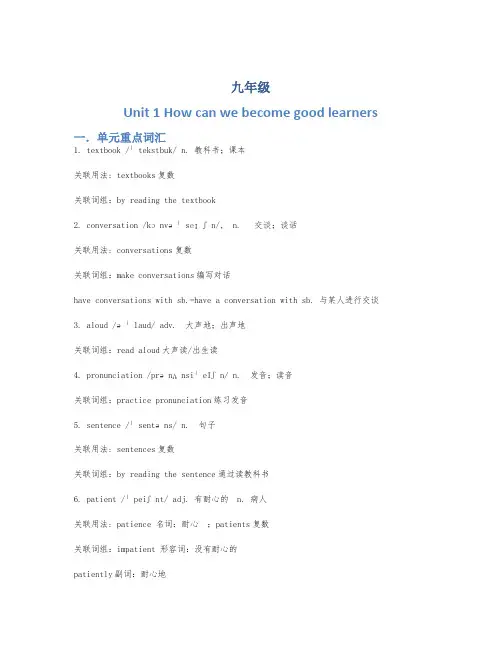
九年级Unit 1 How can we become good learners一.单元重点词汇1.textbook /ˈtekstbuk/ n. 教科书;课本关联用法: textbooks复数关联词组:by reading the textbook2.conversation /kɔnvəˈs eɪʃn/, n. 交谈;谈话关联用法: conversations复数关联词组:make conversations编写对话have conversations with sb.=have a conversation with sb. 与某人进行交谈3.aloud /əˈlaud/ adv. 大声地;出声地关联词组:read aloud大声读/出生读4.pronunciation /prənʌnsiˈeIʃn/ n. 发音;读音关联词组:practice pronunciation练习发音5.sentence /ˈsentəns/ n. 句子关联用法: sentences复数关联词组:by reading the sentence通过读教科书6.patient /ˈpeiʃnt/ adj. 有耐心的 n. 病人关联用法: patience 名词:耐心;patients复数关联词组:impatient 形容词:没有耐心的patiently副词:耐心地be patient with sb.对某人有耐心be patient of sth.对某事能容忍have (no) patience with…对…(没)有耐心lose patience with 对…失去耐心out of patience 没有耐心7.expression /ikˈspreʃn/ n. 表达(方式);表示关联用法:expressions复数关联词组:facial expressions 面部表情8.discover /dIˈskʌvə (r)/ v. 发现;发觉关联用法:discovery 名词:发现9.secret /ˈsi:krət/ n. 秘密;adj. 秘密的;保密的关联用法:secrets复数关联词组:in secret秘密地;keep a secret保密;a secret plan秘密的计划10.look up (在词典,参考书中或通过电脑)查阅;抬头看11.fall in love with 爱上;与⋯⋯相爱12.grammar /ˈgræmə (r)/ n. 语法关联词组:in grammar在语法方面13.repeat /riˈpi:t/ v. 重复;重做关联用法:secrets复数关联词组:repetition名词:重复14.note /nəut/ n. 笔记;记录 v.注意;指出关联用法:notes复数关联词组:please note 清注意;take notes记笔记15.pal /pæl/ n.朋友;伙伴关联词组:penpal笔友16.physics /ˈfiziks/ n. 物理;物理学关联单词:adj. 物理的;身体的;物质的;根据自然规律的,符合自然法则的关联词组:Space Physics 空间物理学物理空间空间物理17.chemistry /ˈkemistri/ n. 化学关联词组:Organic Chemistry 有机化学18.memorize /ˈmeməˌraɪz/ v 记住;记忆关联单词:memory n.记忆关联用法:过去式 memorized过去分词 memorized现在分词 memorizing第三人称单数memorizes典型例句:Have you memorized your lines for the play yet?你记住剧本中的台词了吗?19.pattern /ˈpætn/, /ˈpætən/ n.模式;方式20.pronounce /prəˈnaʊns/ v. 发音关联用法:过去式 pronounced过去分词 pronounced现在分词pronouncing第三人称单数 pronounces关联词组:Pronounce correctly 发音正确正确发音典型例句:I can not pronounce correctly 我不能正确发音21.increase /Inˈkri:s/ v. 增加;增长关联用法:过去式 increased过去分词 increased现在分词 increasing复数 increases第三人称单数 increasesn. 增加;增多;增长关联词组:increase by 增加了;按…增长on the increase 正在增加,正在增长22.speed /spi:d/ n.速度 v.加速关联单词:speeding超速关联用法:过去式 sped或speeded过去分词 sped或speeded现在分词 speeding关联词组:speed up 加速加快速度使加速加快speed limit 速度限制时速限制限速最高车速23.partner /ˈpa:(r)tnə (r)/ n. 搭档;同伴24.born /bɔːn/ v.出生 adj.天生的关联词组:be born with 天生具有born yesterday 乳臭未干典型例句:Swift was born in 1667.斯威夫特生于1667年。
新人教版九年级英语(全一册)Unit1---14单元知识点
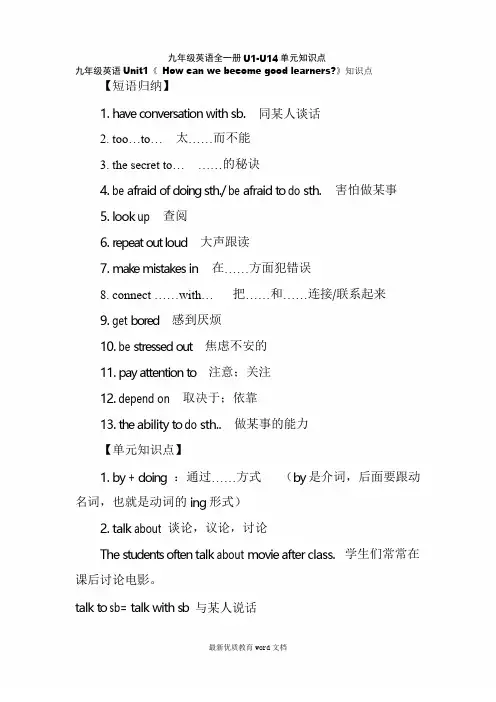
九年级英语全一册U1-U14单元知识点九年级英语Unit1《How can we become good learners?》知识点【短语归纳】1.have conversation with sb.同某人谈话2.too…to…太……而不能3.the secret to………的秘诀4.be afraid of doing sth./be afraid t o do sth.害怕做某事5.look up查阅6.r epeat o ut loud大声跟读7.mak e mistakes in在……方面犯错误8.connect……with…把……和……连接/联系起来9.get b or ed感到厌烦10.be stressed out焦虑不安的11.pay attention t o注意;关注12.depend on取决于;依靠13.the ability t o do sth..做某事的能力【单元知识点】1.by+doing:通过……方式(by是介词,后面要跟动名词,也就是动词的ing形式)2.talk about谈论,议论,讨论The students often talk about movie after class.学生们常常在课后讨论电影。
talk t o sb=talk with sb与某人说话(3. 提建议的句子:①What/ how about +doin g sth.?做…怎么样?(about 后面要用动词的 ing 形式,这一点考试考的比较多)如:What/ How about going shopping?②Why don 't you + do sth.?你为什么不做…?(注意加黑的部分用的是动词的原型)如:Why don 't you go shopping?③Why n ot + do sth. ?为什么不做…?(注意加黑的部分用的是动词的原型)如:Why n ot go shopping?④Let's + do sth.让我们做…吧。
新目标人教版九年级英语上册Unit1全单元知识点归纳
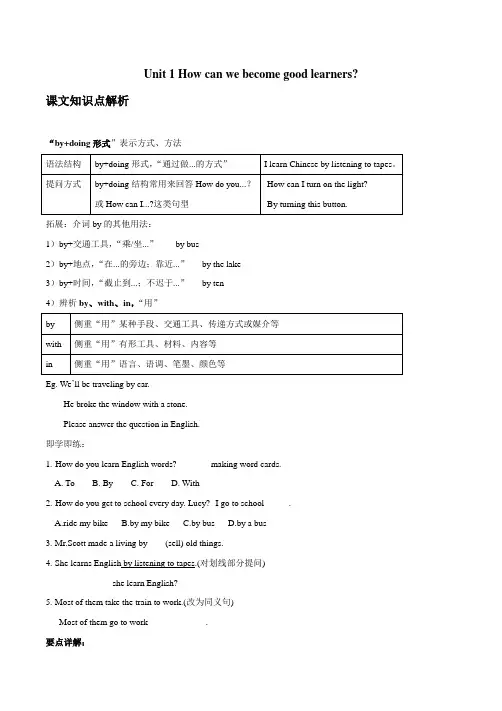
Unit 1 How can we become good learners?课文知识点解析“by+doing 形式”表示方式、方法拓展:介词by 的其他用法:1)by+交通工具,“乘/坐...” by bus2)by+地点,“在...的旁边;靠近...” by the lake3)by+时间,“截止到...;不迟于...” by ten4)辨析by 、with 、in ,“用”Eg. We ’ll be traveling by car.He broke the window with a stone.Please answer the question in English.即学即练:1.-How do you learn English words? -_____making word cards.A. ToB. ByC. ForD. With2.-How do you get to school every day. Lucy? -I go to school _____.A.ride my bikeB.by my bikeC.by busD.by a bus3. Mr.Scott made a living by____(sell) old things.4. She learns English by listening to tapes.(对划线部分提问)_____ ______ she learn English?5. Most of them take the train to work.(改为同义句)Most of them go to work ______ ______.要点详解:Section A1.by asking the teacher for help通过向老师求助。
(P1)1)by,“通过;靠”,后加名词/代词/动名词。
Eg. He had to do all the work by hand.2)ask (sb)for sth,“向某人要某物;要求某人某事”。
新目标英语九年级上册全册知识点
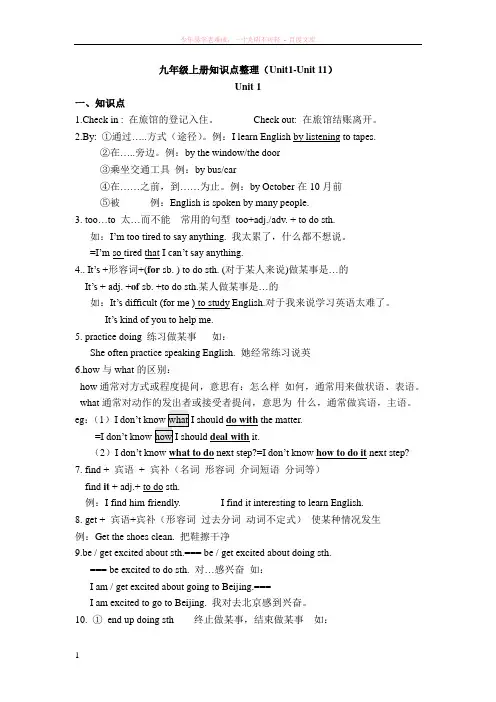
九年级上册知识点整理(Unit1-Unit 11)Unit 1一、知识点1.Check in : 在旅馆的登记入住。
Check out: 在旅馆结账离开。
2.By: ①通过…..方式(途径)。
例:I learn English by listening to tapes.②在…..旁边。
例:by the window/the door③乘坐交通工具例:by bus/car④在……之前,到……为止。
例:by October在10月前8. get + 宾语+宾补(形容词过去分词动词不定式)使某种情况发生例:Get the shoes clean. 把鞋擦干净9.be / get excited about sth.=== be / get excited about doing sth.=== be excited to do sth. 对…感兴奋如:I am / get excited about going to Beijing.===I am excited to go to Beijing. 我对去北京感到兴奋。
10. ①end up doing sth 终止做某事,结束做某事如:The party ended up singing. 晚会以唱歌而结束。
②end up with sth. 以…结束如:The party ended up with her singing. 晚会以她的歌唱而告终。
11.either:①放在否定句末表示“也” .also 也、而且(用于肯定句)常在句子的中间too 也(用于肯定句) 常在句末=as well②两者中的“任一”③either…or…或者…或者.…谓语动词按照就近原则make mistakes (in) doing sth. 在干某事方面出错by mistake 错误地;由于搞错mistake---mistook----mistaken如:I often make mistakes. 我经常犯错。
新目标英语九年级上知识点
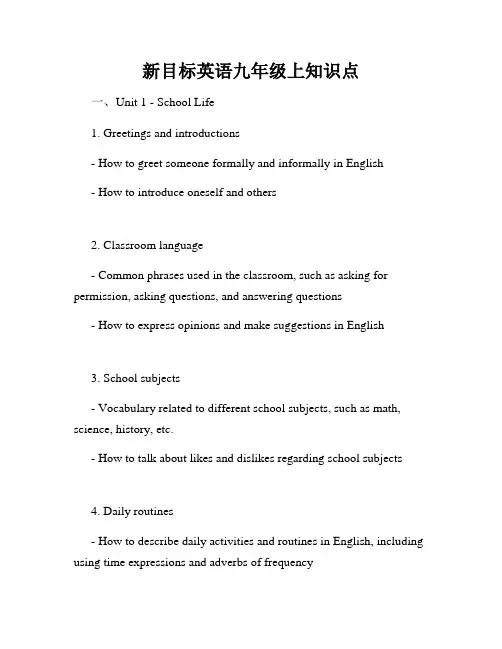
新目标英语九年级上知识点一、Unit 1 - School Life1. Greetings and introductions- How to greet someone formally and informally in English- How to introduce oneself and others2. Classroom language- Common phrases used in the classroom, such as asking for permission, asking questions, and answering questions- How to express opinions and make suggestions in English3. School subjects- Vocabulary related to different school subjects, such as math, science, history, etc.- How to talk about likes and dislikes regarding school subjects4. Daily routines- How to describe daily activities and routines in English, including using time expressions and adverbs of frequency二、Unit 2 - Family Life1. Talking about family members- Vocabulary related to family members, such as parents, siblings, grandparents, etc.- How to describe relationships between family members2. Describing physical appearance and personality- Vocabulary related to physical appearance and personality traits- How to use adjectives to describe people and their characteristics3. Free time activities- Vocabulary related to different leisure activities, such as hobbies, sports, and interests- How to express preferences and talk about past experiences in English4. Family traditions and celebrations- Vocabulary related to family traditions and celebrations, such as birthdays, holidays, and special occasions- How to describe and talk about significant events in one's family三、Unit 3 - Healthy Habits1. Health and well-being- Vocabulary related to health and healthy habits, such as exercise, diet, and sleep- How to talk about personal health routines and give advice in English2. Food and nutrition- Vocabulary related to different types of food, meals, and dietary choices- How to talk about food preferences, ordering in restaurants, and making healthy choices3. Sports and activities- Vocabulary related to different sports and physical activities- How to talk about sports events, competitions, and personal achievements4. Health issues and emergencies- Vocabulary related to common health issues, injuries, and emergencies- How to describe symptoms, seek medical help, and provide first aid instructions in English四、Unit 4 - Environmental Protection1. Environmental issues- Vocabulary related to environmental problems, such as pollution, deforestation, and climate change- How to express concerns and opinions about environmental issues in English2. Recycling and conservation- Vocabulary related to recycling, reducing waste, and conserving natural resources- How to talk about eco-friendly habits and initiatives3. Travel and transportation- Vocabulary related to different modes of transportation, such as cars, trains, and planes- How to ask for and give directions, talk about travel experiences, and plan trips in English4. Global cooperation- Vocabulary related to international cooperation and organizations working towards environmental protection- How to discuss global issues, express opinions, and propose solutions in EnglishThis is a brief overview of the knowledge points covered in the New Concept English Grade 9 textbook. Each unit has specific grammar rules, reading passages, and listening exercises to help students improve their English language skills. It is recommended for students to practice regularly and supplement their learning with additional resources to enhance their proficiency in English.。
人教版新目标初中英语九年级全一册 知识点总结1单元
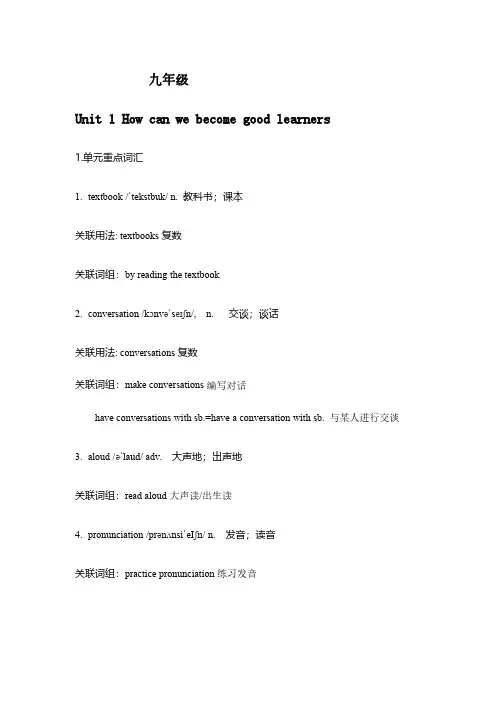
九年级Unit1How can we become good learners1.单元重点词汇1.textbook/ˈtekstbuk/n.教科书;课本关联用法:textbooks复数关联词组:by reading the textbook2.conversation/kɔnvəˈs eɪʃn/,n.交谈;谈话关联用法:conversations复数关联词组:make conversations编写对话have conversations with sb.=have a conversation with sb.与某人进行交谈3.aloud/əˈlaud/adv.大声地;出声地关联词组:read aloud大声读/出生读4.pronunciation/prənʌnsiˈeIʃn/n.发音;读音关联词组:practice pronunciation练习发音5.sentence/ˈsentəns/n.句子关联用法:sentences复数关联词组:by reading the sentence通过读教科书6.patient/ˈpeiʃnt/adj.有耐心的n.病人关联用法:patience名词:耐心;patients复数关联词组:impatient形容词:没有耐心的patiently副词:耐心地be patient with sb.对某人有耐心be patient of sth.对某事能容忍have(no)patience with…对…(没)有耐心lose patience with对…失去耐心out of patience没有耐心7.expression/ikˈspreʃn/n.表达(方式);表示关联用法:expressions复数关联词组:facial expressions面部表情8.discover/dIˈskʌvə(r)/v.发现;发觉关联用法:discovery名词:发现9.secret/ˈsi:krət/n.秘密;adj.秘密的;保密的关联用法:secrets复数关联词组:in secret秘密地;keep a secret保密;a secret plan秘密的计划10.look up(在词典,参考书中或通过电脑)查阅;抬头看11.fall in love with爱上;与⋯⋯相爱12.grammar/ˈgræmə(r)/n.语法关联词组:in grammar在语法方面13.repeat/riˈpi:t/v.重复;重做关联用法:secrets复数关联词组:repetition名词:重复14.note/nəut/n.笔记;记录v.注意;指出关联用法:notes复数关联词组:please note清注意;take notes记笔记15.pal/pæl/n.朋友;伙伴关联词组:pen pal笔友16.physics/ˈfiziks/n.物理;物理学关联单词:adj.物理的;身体的;物质的;根据自然规律的,符合自然法则的关联词组:Space Physics空间物理学物理空间空间物理17.chemistry/ˈkemistri/n.化学关联词组:Organic Chemistry有机化学18.memorize/ˈmeməˌraɪz/v记住;记忆关联单词:memory n.记忆关联用法:过去式memorized过去分词memorized现在分词memorizing第三人称单数memorizes典型例句:Have you memorized your lines for the play yet?你记住剧本中的台词了吗?19.pattern/ˈpætn/,/ˈpætən/n.模式;方式20.pronounce/prəˈnaʊns/v.发音关联用法:过去式pronounced过去分词pronounced现在分词pronouncing第三人称单数pronounces关联词组:Pronounce correctly发音正确正确发音典型例句:I can not pronounce correctly我不能正确发音21.increase/Inˈkri:s/v.增加;增长关联用法:过去式increased过去分词increased现在分词increasing复数increases第三人称单数increasesn.增加;增多;增长关联词组:increase by增加了;按…增长on the increase正在增加,正在增长22.speed/spi:d/n.速度v.加速关联单词:speeding超速关联用法:过去式sped或speeded过去分词sped或speeded现在分词speeding 关联词组:speed up加速加快速度使加速加快speed limit速度限制时速限制限速最高车速23.partner/ˈpa:(r)tnə(r)/n.搭档;同伴24.born/bɔːn/v.出生adj.天生的关联词组:be born with天生具有born yesterday乳臭未干典型例句:Swift was born in1667.斯威夫特生于1667年。
(完整)新人教版九年级英语Unit1--14单元知识点总结,推荐文档
九年级英语Unit1《 How can we become good learners?》知识点 【短语归纳】 1. have conversation with sb. 同某人谈话 2. too…to… 太……而不能 3. the secret to… ……的秘诀 4. be afraid of doing sth./ be afraid to do sth. 害怕做某事 5. look up 查阅 6. repeat out loud 大声跟读 7. make mistakes in 在……方面犯错误 8. connect ……with… 把……和……连接/联系起来 9. get bored 感到厌烦 10. be stressed out 焦虑不安的 11. pay attention to 注意;关注 12. depend on 取决于;依靠 13. the ability to do sth.. 做某事的能力 【单元知识点】 1. by + doing :通过……方式(by是介词,后面要跟动名词,也就是动词的ing形式) 2. talk about 谈论,议论,讨论 The students often talk about movie after class. 学生们常常在课后讨论电影。
talk to sb= talk with sb 与某人说话 3. 提建议的句子: ①What/ how about +doing sth.? 做…怎么样?(about后面要用动词的ing形式,这一点考试考的比较多) 如:What/ How about going shopping? ②Why don't you + do sth.? 你为什么不做…?(注意加黑的部分用的是动词的原型) 如:Why don't you go shopping? ③Why not + do sth. ? 为什么不做…?(注意加黑的部分用的是动词的原型) 如:Why not go shopping? ④Let's + do sth. 让我们做…吧。
人教版新目标英语九年级上知识点汇总1~12…….
Unit 1I、重点词汇:1.pronounce—pronunciation2. differently—different—difference3. slowly—slow4. soft—hard5.easy—easily6.learn—learnerII、重点短语:1.lisen to tapes 听录音2. ask the teacher for help 向老师请求帮助3. read aloud 朗读4. speaking skills 口头表达能力5.spoken English 英语口语6. end up 结束ter on 以后,随后8. make mistakes 犯错,出错ugh at 嘲笑,取笑10.take notes 做笔记,做记录11.look …up (在词典、参考书等中查阅,查找12. make up 编造,组成13.deal / do with 处理,应付14.be angry with 生……的气15.go by (指时间过去,消逝16.try one’s best to do sth. 尽力做……17.break off 突然中止,中断18. with the help of 在……的帮助下19.regard…as…把……当做……20.be afraid of doing / to do sth 害怕做某事21. first of all 首先,开始22. have trouble / a difficult / hard time doing sth. 做某事有困难III、重点句型:1.It’s too hard to understand the voices. 理解那些话有困难。
2. How do you study for a test? 你怎么为考试而学习的? I study by listening to tapes. 我通过听磁带学习。
3. Studying grammar is a great way to learn a language. 学语法是学习语言的一个好办法。
人教版新目标英语九年级上册期中复习知识归纳
期中知识要点复习单选部分1. 人称代词:主格、宾格、形容词性物主代词、名词性物主代词2. 时间介词:on、in、at3. 特殊疑问词:where、when、what、which、how4. 连词:and、or、but、so、unless、although5. 情态动词及疑问句回答:must、need、can、may、should6. 形容词或副词:原级、比较级、最高级7. 非谓语动词:to do、do、doing8. 时态:一般将来时、一般过去时、现在进行时、过去进行时、现在完成时9. 不定代词:复合不定代词、all、each、both,much、many、(a)little、(a)few、others、another、either、neither10. 被动语态11. 主将从现:if / as soon as12. 宾语从句Unit 1完成句子—中考句型1. …怎么样?How about + n./doing sth.2. 太…而不能…too…to…3. 根本不,一点儿也不not…at all …4. 为什么不…?Why not + 动原?/ Why don’t y ou+ 动原?5. 对于某人来说做某事是…样的It’s + adj. for sb. to do sth.6. 因…而出名be famous for…7.让我们…吧Let’s + do重点词组by doing practice doing sth. ask sb. for sth.the best way to do sth.watch sb. do sth. have fun doing sth. get excited about end up doing sth.forget to do sth. be afraid to do/of doing decide to do sth. try to do sth.one of +the 最高级+ 名词复数look it/them up be angry with sb.complain about learn about try one’s best to do sth.Unit 2完成句子—中考句型1. 过去常常做某事used to do sth.2.花时间/钱做某事spend 时间/钱doing sth.3. 尽可能…as…as possible4. 送/寄给某人某物send sth. to sb.=send sb. sth.5. 使某人…样make sb. + adj.重点词组be interested in play the piano speak in front of others hate doing sth. worry about mind doing sth. take sth. to sb.= take sb. sth. give up doing sth. make a decision take pride in pay (more) attention toUnit 3完成句子—中考句型1. 我认为…不…I don’t think +从句2. 停止做某事stop doing sth.3. 结束做某事finish doing sth.4. 愿意做某事would like to do sth.5. 对…有好处be good for6. 使某人/某物保持某种状态keep sb./sth. + adj.7. …和…都both…and…8. 和…一样…as…as…9. 看到某人做/正在某事see sb. do/doing sth.重点词组serious enough need to do sth. instead of allow sb. to do sth.be allowed to do sth. care about stay up clean upbe strict with sb. learn from sb. concentrate on teach sb. to do sth. Some…,others…agree with sb.achieve one’s dream get in the way ofUnit 4完成句子—中考句型1. …迟到be late for2. 帮助某人做某事help sb. do sth. / help sb. with sth.3. 要求/让某人做某事ask sb. to do sth.4. 向某人借某物borrow sth. from sb. = borrow sb. sth.5. 因…而出名be famous for重点词组take a walk give a speech wait for start doing sth. find outget along with think about let sb. down come up with offer sth. tosb.Unit 5完成句子—中考句型1. 听见某人正在做某事hear sb. doing sth.2. 给某人看某物show sth. to sb.3. 那儿有…There be…重点词组must be belong to sb. too much get on use up期中作文复习注意:请对照汉语进行翻译练习。
人教版新目标英语九年级上知识点汇总1-12
人教版新目标英语九年级上知识点汇总Unit11. by + doing通过……方式如:by studying with a groupby 还可以表示:“在…旁”、“靠近”、“在…期间”、“用、”“经过”、“乘车”等如:I live by the river. I have to go back by ten o’clock.The thief entered the room by the window.The student went to park by bus.2. talk about 谈论,议论,讨论如:The students often talk about movie after class. 学生们常常在课后讨论电影。
talk to sb. === talk with sb. 与某人说话3. 提建议的句子:①What/ how about +doing sth.?如:What/ How about going shopping?②Why don’t you + do sth.?如:Why don’t you go shopping?③Why not + do sth. ? 如:Why not go shopping?④Let’s + do sth. 如:Let’s go shopping⑤Shall we/ I + do sth.?如:Shall we/ I go shopping?4. a lot 许多常用于句末如:I eat a lot. 我吃了许多。
5. too…to 太…而不能常用的句型too+adj./adv. + to do sth.如:I’m too tired to say anything. 我太累了,什么都不想说。
6. aloud, loud与loudly的用法三个词都与"大声"或"响亮"有关。
①aloud是副词,重点在出声能让人听见,但声音不一定很大,常用在读书或说话上。
- 1、下载文档前请自行甄别文档内容的完整性,平台不提供额外的编辑、内容补充、找答案等附加服务。
- 2、"仅部分预览"的文档,不可在线预览部分如存在完整性等问题,可反馈申请退款(可完整预览的文档不适用该条件!)。
- 3、如文档侵犯您的权益,请联系客服反馈,我们会尽快为您处理(人工客服工作时间:9:00-18:30)。
人教版新目标英语九年级上知识点汇总 1Unit11. by + doing通过……方式如:by studying with a groupby 还可以表示:“在…旁”、“靠近”、“在…期间”、“用、”“经过”、“乘车”等如:I live by the river. I have to go back by ten o’clock.The thief entered the room by the window.The student went to park by bus.2. talk about 谈论,议论,讨论如:The students often talk about movie after class. 学生们常常在课后讨论电影。
talk to sb. === talk with sb. 与某人说话3. 提建议的句子:①What/ how about +doing sth.?如:What/ How about going shopping?②Why don’t you + do sth.?如:Why don’t you go shopping?③Why not + do sth. ? 如:Why not go shopping?④Let’s + do sth. 如:Let’s go shopping⑤Shall we/ I + do sth.?如:Shall we/ I go shopping?4. a lot 许多常用于句末如:I eat a lot. 我吃了许多。
5. too…to 太…而不能常用的句型too+adj./adv. + to do sth.如:I’m too tired to say anything. 我太累了,什么都不想说。
6. aloud, loud与loudly的用法三个词都与"大声"或"响亮"有关。
①aloud是副词,重点在出声能让人听见,但声音不一定很大,常用在读书或说话上。
通常放在动词之后。
aloud没有比较级形式。
如: He read the story aloud to his son.他朗读那篇故事给他儿子听。
②loud可作形容词或副词。
用作副词时,常与speak, talk,laugh等动词连用,多用于比较级,须放在动词之后。
如:She told us to speak a little louder. 她让我们说大声一点。
③loudly是副词,与loud同义,有时两者可替换使用,但往往含有令人讨厌或打扰别人的意思,可位于动词之前或之后。
如:He does not talk loudly or laugh loudly in public. 他不当众大声谈笑。
7. not …at all 一点也不根本不如:I like milk very much. I don’t like coffee at all. 我非常喜欢牛奶。
我一点也不喜欢咖啡。
not经常可以和助动词结合在一起,at all 则放在句尾8. be / get excited about sth.=== be / get excited about doing sth.=== be excited to do sth. 对…感兴奋如:I am / get excited about going to Beijing.===I am excited to go to Beijing. 我对去北京感到兴奋。
9. ①end up doing sth 终止做某事,结束做某事如:The party ended up singing. 晚会以唱歌而结束。
②end up with sth. 以…结束如:The party ended up with her singing. 晚会以她的歌唱而告终。
10. first of all 首先. to begin with 一开始later on 后来、随11. also也、而且(用于肯定句)常在句子的中间either也(用于否定句)常在句末too也(用于肯定句) 常在句末12. make mistakes 犯错如:I often make mistakes. 我经常犯错。
make a mistake 犯一个错误如:I have made a mistake.我已经犯了一个错误。
13. laugh at sb. 笑话;取笑(某人)如:Don’t laugh at me!不要取笑我!14. take notes 做笔记,做记录15. enjoy doing sth .喜欢做…乐意做…如:She enjoys playing football. 她喜欢踢足球。
enjoy oneself 过得愉快如:He enjoyed himself. 他过得愉快。
16. native speaker 说本族语的人17. make up 组成、构成18. one of +(the+ 形容词比较级)+名词复数形式…其中之一如:She is one of the most popular teachers.她是最受欢迎的教师之一。
19. It’s +形容词+(for sb. ) to do sth. (对于某人来说)做某事…如:It’s difficult (for me ) to study English.对于我来说学习英语太难了。
句中的it 是形式主语,真正的主语是to study English20. practice doing 练习做某事如:She often practice speaking English. 她经常练习说英语。
21. decide to do sth. 决定做某事如:LiLei has decided to go to BeiJing . 李雷已经决定去北京。
22. unless 假如不,除非引导条件状语从句如:You will fail unless you work hard..假如你不努力你会失败。
I won’t write unless he writes first. 除非他先写要不我不写23. deal with 处理如:I dealt with a lot of problem.24. worry about sb./ sth. 担心某人/ 某事如:Mother worried about his son just now.妈妈刚才担心他的儿子。
25. be angry with sb. 对某人生气如:I was angry with her. 我对她生气。
26. perhaps === maybe 也许27. go by (时间) 过去如:Two years went by. 两年过去了。
28. see sb. / sth. doing看见某人正在做某事强调正在发生see sb. / sth. do看见某人在做某事如:如:She saw him drawing a picture in the classroom.她看见他正在教室里画画。
29. each other 彼此30. regard…as …把…看作为….如:The boys regarded Anna as a fool. 这些男孩把安娜看成傻瓜。
31. too many许多修饰可数名词如:too many girlstoo much许多修饰不可数名词如:too much milkmuch too太修饰形容词如:much too beautiful32. change…into…将…变为…如:The magician changed the pen into a book.这个魔术师将这本书变为一本书。
33. with the help of sb. == with one’s help 在某人的帮助下如:with the help of LiLei == with LiLei’s help在李雷的帮助下34. compare …to …把…与…相比如:Compare you to Anna, you are lucky.你和安娜相比,你是幸运的。
35. instead 代替用在句末,副词(字面上常不译出来)instead of sth. / doing sth. 代替,而不是用在句中,动词如:Last summer I went to Beijing. This year I’m going to Shanghai instead.去年夏天我去北京, 今年我将要去上海。
I will go instead of you. 我将代替你去。
He stayed at home instead of going swimming.他呆在家里而不是去游泳。
九年级英语Unit21. used to do sth. 过去常常做某事否定形式:didn’t use to do sth. / used not to do sth.如:He used to play football after school. 放学后他过去常常踢足球。
Did he use to play football? Yes, I did. No, I didn’t.He didn’t use to smoke. 他过去不吸烟。
2. 反意疑问句①肯定陈述句+否定提问如:Lily is a student, isn’t she?Lily will go to China, won’t she?②否定陈述句+肯定提问如:She doesn’t come from China, does she?You haven’t finished homework, have you?③提问部分用代词而不用名词Lily is a student, isn’t she?④陈述句中含有否定意义的词,如:little, few, never, nothing, hardly等。
其反意疑问句用肯定式。
如:He knows little English, does he?他一点也不懂英语,不是吗?They hardly understood it, did they?他们几乎不明白,不是吗?3. play the piano弹钢琴4. ①be interested in sth. 对…感兴趣②be interested in doing sth. 对做…感兴趣如:He is interested in math, but he isn’t interested in speaking English. 他对数学感兴趣,但是他对说英语不感兴趣。
